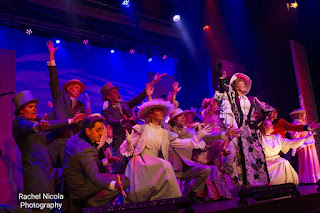Review of Salomé at Greenwich Theatre
What is ‘power’? According to an online dictionary, power is the capacity or ability to direct or influence the behaviour of others or the course of events. However, even with this definition, whilst many people believe they have power, very few actually do. There is a moment in Game of Thrones when Queen Cersei, explains the concept to Lord Baelish in three words, “Power is power”. Knowing who actually wields power is one of the conundrums that remains at the end of Oscar Wilde’s 1891 play Salomé which is Lazarus Theatre Company’s final production in their season at Greenwich Theatre.
Things are not going well in the Roman province of Judea. Herod Antipas (Jamie O’Neill), the Tetrarch does not have a secure hold on the reigns of power in his country, Herod has many distractions in his life. There are rivals for his throne – which he basically holds at the will of Caesar – and there is unrest in his province. Chief among those causing unrest is a Judean prophet by the name of Jokanaan (Jamal Renaldo), currently languishing in the Tetrarch’s prison and shouting his thoughts and prophecies for all the world to hear. As well as the foretelling of the coming Messiah, Jokanaan never misses a chance to rail against Herod’s wife Herodias (Annemarie Anang), who was previously married to Herod’s brother, and who is understandably not happy at the vile things that the prophet shouts about her. Herod though refuses to do anything about Jokanaan, putting his own interpretation on the prophet’s words. Herod does have a problem with someone though. He is obsessed with the handsome young Prince Salomé (Bailey Pilbeam), son of his wife and therefore his stepson and nephew. For his part, Salomé does not reciprocate any feelings his stepfather may have and, after illicitly being shown Jokanaan, Salomé has become obsessed with possessing the prophet and having him to himself. On a hot moon-drenched night, all of the obsessions come to a head when Herod promises his stepson that, “If you dance for me, you may ask of me what you will, and I will give it to you, even unto the half of my kingdom.”

Jamie O’Neill as Herod, Annemarie Anang as Herodias. Photo by Adam Trigg.
This was my first time of seeing the Oscar Wilde version of Salomé, though I have seen the Strauss opera – but more of that later. The first thing I have to ask is why was this presented as a two-act play? The original is, I believe one act and the addition of an interval was, to my mind a mistake which broke the flow of the narrative. My other gripe with the show is the wordiness. Wilde is obviously one of those who subscribe to the “why use one word when you can use twenty” theories of writing and really, really believes in repeating himself. For example, the scene where Salomé meets Jokanaan, where I got to the point that if the prince had said, “I’m going to kiss your lips” one more time I thought I might rush on stage to kiss and stop him talking any more. Having said that, there were some really lyrical moments in the text. This is particularly true when Herod is trying – with almost Trumpian boasting – to persuade Salomé to ask for anything but the head of Jokanaan. However, there were times when the addition of distinctly twenty-first-century language to the original nineteenth-century script doesn’t fully work.
Making Salomé a male character worked well and Bailey Pilbeam may be young but had a wonderful self-possession in his performance bringing the sultriness and innocence of Salomé to life wonderfully. The ‘dance of the seven veils’ – which was performed to the music from the Strauss opera – was a wonderful, teasing striptease with the removal of seven items (and yes I did count to make sure) that had a profound and very obvious effect on Jamie O’Neill’s Herod. As a character, Herod must be difficult to play as he runs through a mass of contradictory personalities during the story – everything from a fawning servant of Ceaser through to a man on the brink of mental collapse. O’Neill portrays every facet really well and, in his interactions with his wife, you see a couple that have grown to pretty much despise each other but keep together for the sake of appearance. Indeed, given Herod’s ruthlessness, I’m surprised he didn’t have his wife done away with long before we get to meet them.
There are some really superb moments in Ricky Dukes’ expert direction and to give an example during the second act, look at the body language of Herodias and Salomé as they face Herod. The two stand erect, with fists clenched and impassive faces with the mother/son bond so obvious between them as they stand. Full credit also goes to Hector Murray and Will Thompson for their highly evocative lighting and sound. Lazarus, as a company are not big on sets and this production is no exception. Gold balloons, cups and candelabras dominated the stage and surrounding area, suggesting a party. But the gold was burnished and not quite gleaming which, to me signalled a king trying to make others believe everything is golden whilst, in reality, things were cheap and tawdry.
Salomé, being set in 2019 still works really well as an observation of the current state of world politics. A ruler more interested in glamour than substance, who is convinced everyone is out to get them and puts their own interpretation on everything they hear. Sound familiar?
Overall, this has been an extremely strong season for Lazarus Theatre Company. Three very different plays, each given a contemporary twist that, on the whole, improved the stories and increased their relevance to a modern audience.
Review by Terry Eastham


Comments
Post a Comment